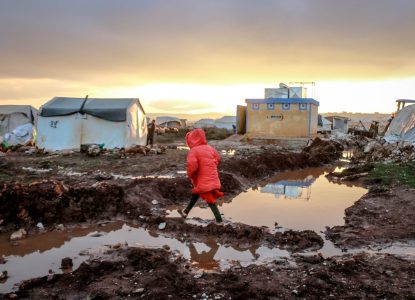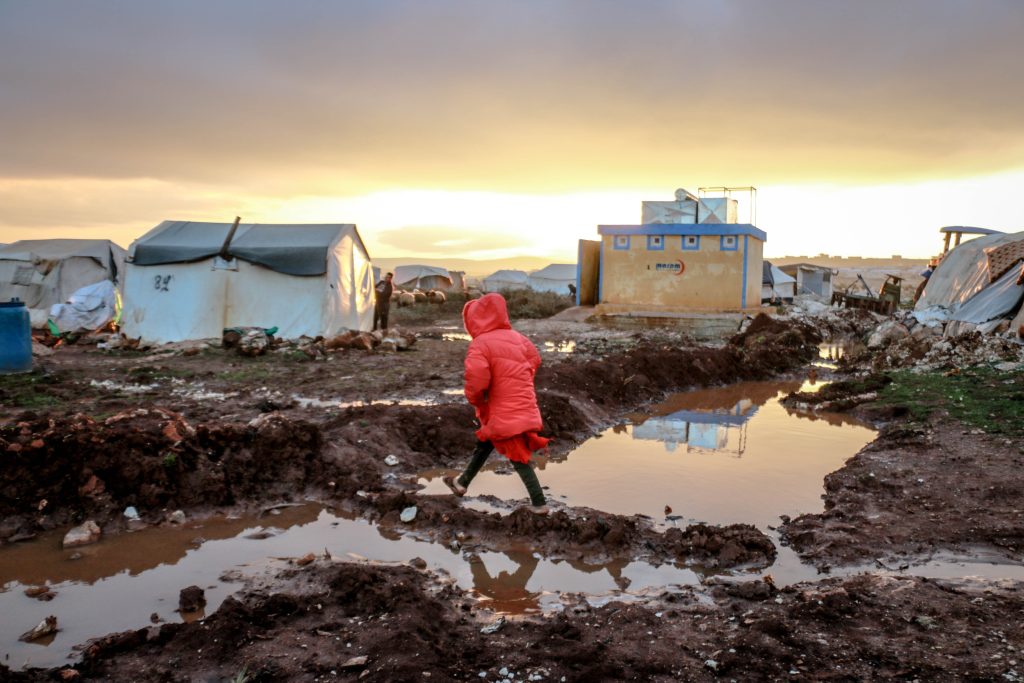By JoAnne Wadsworth, Communications Consultant, G20 Interfaith Forum
– – –
On June 16th, 2023, the G20 Interfaith Forum, in cooperation with the UN Refugee Agency (UNHCR), held a webinar entitled “World Refugee Day with UNHCR: The power of inclusion in developing durable solutions for refugees.”
Speakers included Mandi Lindner, U.S. Public Engagement and Outreach at UNHCR; Ahmed Ahmed, Former Refugee and Lancaster, PA City Council Member; and Aseel Elborno, former refugee and Islamic Relief USA Advocacy Campaign Specialist. Christina Tobias-Nahi, Director of Public Affairs at Islamic Relief USA and member of the G20 Interfaith Forum working group on Refugees, moderated the discussion.
Christina Tobias-Nahi began the webinar by welcoming all participants and attendees, and recognizing the significance of the upcoming World Refugee Day commemorations in light of recent tragedies in Greece, with the sinking of a migrant boat that killed over 100 people and the turning away of migrants at sea. After introducing the speakers, she invited each of them to offer comments.
Mandi Lindner
Lindner focused her comments on providing an overview of global refugee and displacement trends. The UNCHR’s 2022 Global Trends Report was recently released, and reported 108M displaced people worldwide—the highest even annual increase in displaced people. Since the end of 2022, that number has continued to rise.
She emphasized that children are particularly heavily impacted, and that 76% of hosting countries are low and middle-income countries and struggle to host and bear the brunt of these crises. In the US, we have seen a threefold increase in cases of people seeking asylum at the border, which makes up the majority of our numbers.
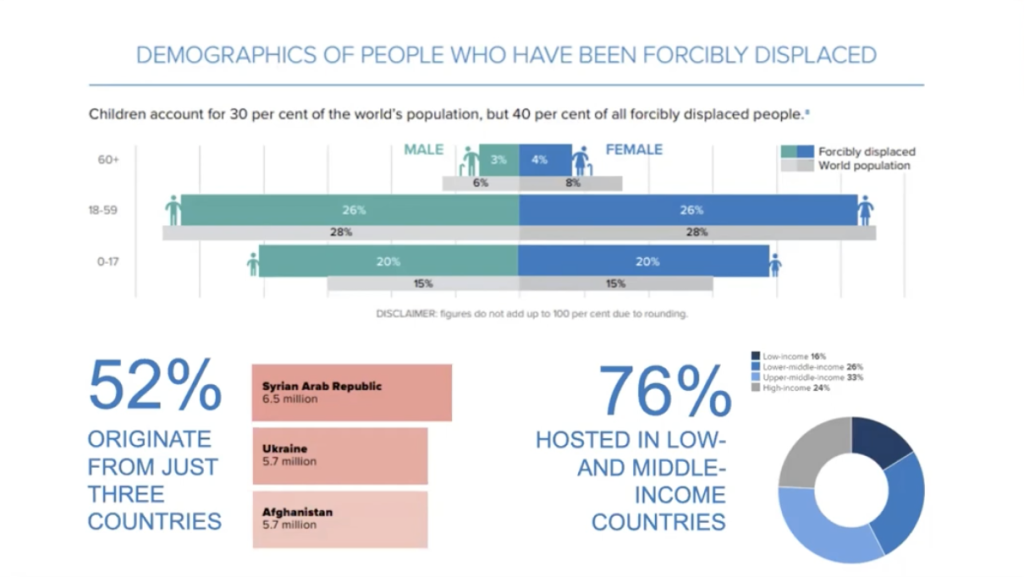
In conclusion, she emphasized the two objectives of the World Refugee Day celebrations in 2023, and encouraged all listeners to become better advocates by sharing UNCHR content on social media and spreading awareness of the issue.
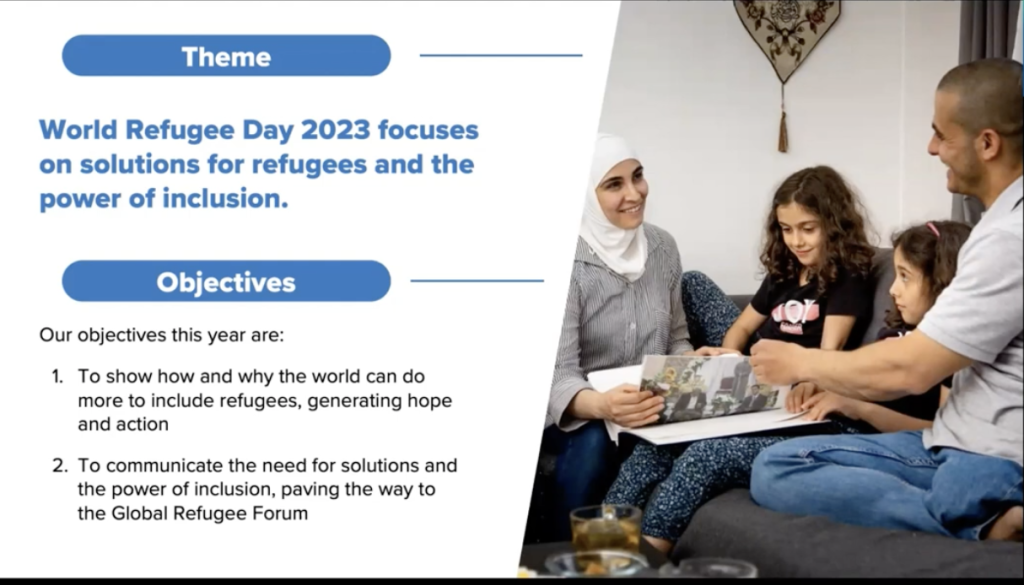
Aseel Elborno
Elborno focused her comments on her own experiences as a refugee and how those experience affect her work and efforts today. At age seven, she was part of the second largest exodus from Palestine in history. She and her family were living in Kuwait, and when Hussein invaded Kuwait in 1990, 300K Palestinians were forcibly removed.
She said she remembered hiding underneath her two-year-old brother’s crib as rockets launched over their house. Eventually, because her brother was born in the USA, the US evacuated her whole family to North Carolina—but they were only allowed to pack two suitcases and whatever they could carry and leave immediately. As banks were locked, they could only take the cash they had on hand. Aseel, at age seven, contributed her cash too.
From that point on, Elborno and her family became ambassadors and advocates of a sort between the group of Palestinian refugees that they came with and their American hosts, as they could speak both Arabic and English. They were also among the few families who were quickly sponsored by an employer. Many others, who didn’t have the same educational and language skills, had to begin the painful pathway of trying to get legal pathways to citizenship.
Elborno was a freshman in college when 9/11 happened, and everything changed for her again. She heard people say horrible, derogatory things about Arabs and Muslims, saw a friend get attacked on campus, and quickly changed her major to political science to begin a path of advocacy work. She continues to do that now.
“Coming as a refugee is difficult. You’re starting from absolutely zero. It took my mother twenty years to get over that trauma in her life. Now, I get to push advocacy campaigns to help refugees. I want to empower these people and help them make an impact.”
Ahmed Ahmed
Ahmed also focused his comments on his experiences as a refugee, and how they shape his advocacy and political work today. He was born in a refugee camp latrine on the border of Chad and Cameroon, and almost died of malaria and malnutrition as a baby. His family spent seven years in refugee camps across Africa, then finally resettled to Lancaster, Pennsylvania, which at the time was the refugee resettlement capital of America. Though they came with nothing but the shirts on their backs and a copy of the Quran, they quickly found a home and a life there.
Because they were so welcomed in their move to Lancaster, Ahmed became fascinated with the concept of welcoming, and decided to study political science at Howard University in order to get more involved in welcoming and community organizing. After working with political campaigns and the Church World Service, he applied for a vacancy on the Lancaster City Council and was accepted. Today, he’s working to ensure that welcoming is a long-lasting commitment in Lancaster—including work on affordable housing, translation services, and more.
“I feel it’s important to seek public office so that other refugees see that they can be leaders too and that they can have a seat at the table. You can have access to government. You can even be a part of it. That’s very important to know for refugees who lost their homes because of government unrest. Here, we don’t have to live in the shadows. We can rebuild what we’ve lost here in our new homes, and we too can be leaders.”
Q&A Session
Tobias-Nahi then posed several questions from the audience to the speakers.
What do durable solutions look like?
Mandi Lindner: Durable solutions can look different depending on the level. There are civil policy-level decisions that allow more people to resettle—special immigrant visas, universities offering tuition and room and board, etc. Most stateless issues could also be eliminated with civil policy decisions. Then, at the community level, it’s language access, papers and registration to work, drivers licenses, cars, etc. As individuals, we can call, go to meetings, volunteer, and advocate for these things.
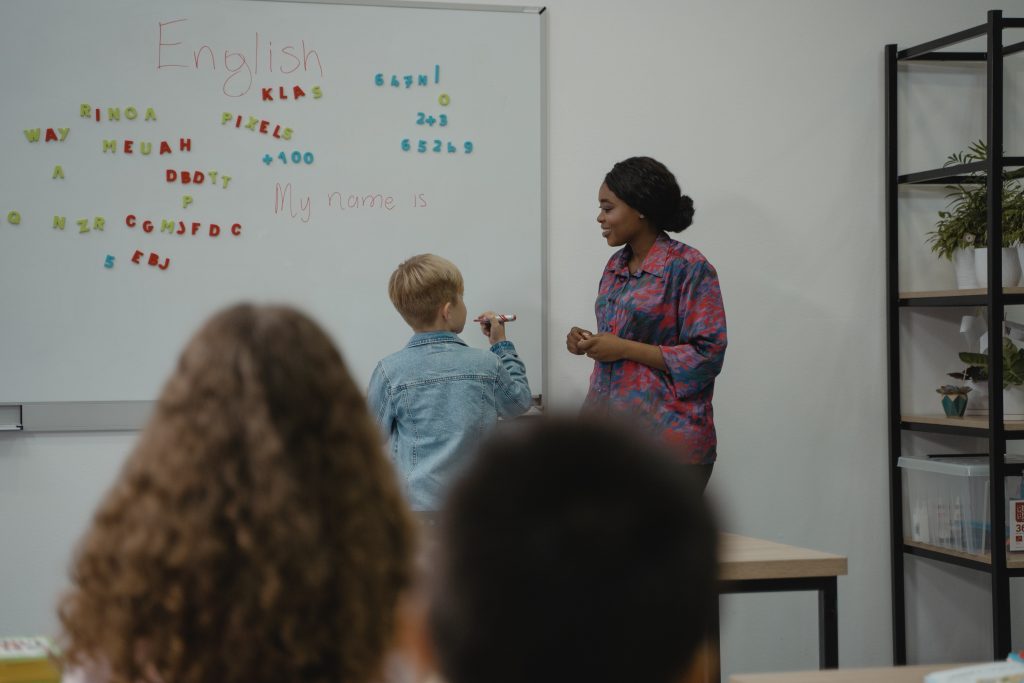
How do you mobilize those around you to be more civically engaged and step into these spaces?
Aseel Elborno: When people come to the US, they assume things will work like they did in their home country—so they’re afraid to get civically engaged. Maybe start with group discussions to figure out what the community is in need of. Listening sessions. Things get overlooked without the voices of those vulnerable communities. Eliminate barriers of entry to the meetings, put decision makers at the table with them, and help them feel welcome. They’ll eventually learn that their engagement is really important.
Ahmed Ahmed: We have a “new neighbors speakers bureau” where refugees share their stories with organizations, businesses, and groups. They’re mentored and taught the art of storytelling, and provided with a way to build bridges in their community and lift themselves from that trauma. We need to get that advocacy from those we need to hear from most.
Where do we go from here? The numbers are only growing, so how do we encourage peaceful solutions, and for more countries to receive and resettle?
Mandi Lindner: There’s no easy answer. Responsibility sharing is important. It takes political will and solidarity. The more we talk about it and hear real stories and understand what they mean, we realize we’re the same on the individual level. We learn to talk as allies.
Aseel Elborno: It’s important to have a shift in narrative. One day you’re sitting peacefully at home, and the next you’re packing two pieces of luggage and dragging yourself across the world. We tend to think we’re untouchable in the US, but if we understand that everything can change for everyone, and even you can be a refugee, your whole attitude changes.
Ahmed Ahmed: We need better education efforts. We can’t leave it up to disinformation. We should also contact elected officials and tell them to welcome and advocate for refugees. Representing all of us means all of us.
Conclusion
In conclusion, Tobias-Nahi invited the speakers to offer final remarks.
Mandi Lindner: Reach out to UNHCR and share your story if you have something to share.
Aseel Elborno: Reach out to me at Islamic Relief if you’d like to be an advocate. You can actually make a difference. You matter, and you can do something today that could help truly save a life.
Ahmed Ahmed: Get involved. Share your story. We must not live in the shadows. Encourage refugee leaders to run for office. We need to be visible leaders for others in our community.
Tobias-Nahi then thanked participants and attendees and closed the meeting. Watch the full recording of the webinar below.
– – –
JoAnne Wadsworth is a Communications Consultant for the G20 Interfaith Association and acting editor of the “Viewpoints” blog.


